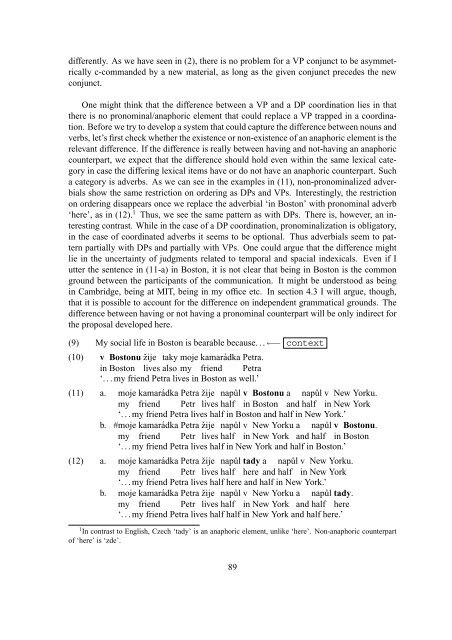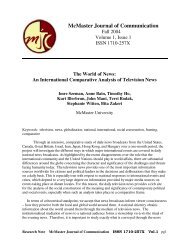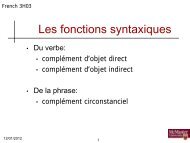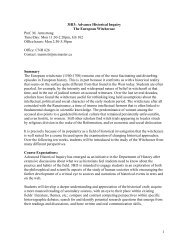The Syntax of Givenness Ivona Kucerová
The Syntax of Givenness Ivona Kucerová
The Syntax of Givenness Ivona Kucerová
You also want an ePaper? Increase the reach of your titles
YUMPU automatically turns print PDFs into web optimized ePapers that Google loves.
differently. As we have seen in (2), there is no problem for a VP conjunct to be asymmetrically<br />
c-commanded by a new material, as long as the given conjunct precedes the new<br />
conjunct.<br />
One might think that the difference between a VP and a DP coordination lies in that<br />
there is no pronominal/anaphoric element that could replace a VP trapped in a coordination.<br />
Before we try to develop a system that could capture the difference between nouns and<br />
verbs, let’s first check whether the existence or non-existence <strong>of</strong> an anaphoric element is the<br />
relevant difference. If the difference is really between having and not-having an anaphoric<br />
counterpart, we expect that the difference should hold even within the same lexical category<br />
in case the differing lexical items have or do not have an anaphoric counterpart. Such<br />
a category is adverbs. As we can see in the examples in (11), non-pronominalized adverbials<br />
show the same restriction on ordering as DPs and VPs. Interestingly, the restriction<br />
on ordering disappears once we replace the adverbial ‘in Boston’ with pronominal adverb<br />
‘here’, as in (12). 1 Thus, we see the same pattern as with DPs. <strong>The</strong>re is, however, an interesting<br />
contrast. While in the case <strong>of</strong> a DP coordination, pronominalization is obligatory,<br />
in the case <strong>of</strong> coordinated adverbs it seems to be optional. Thus adverbials seem to pattern<br />
partially with DPs and partially with VPs. One could argue that the difference might<br />
lie in the uncertainty <strong>of</strong> judgments related to temporal and spacial indexicals. Even if I<br />
utter the sentence in (11-a) in Boston, it is not clear that being in Boston is the common<br />
ground between the participants <strong>of</strong> the communication. It might be understood as being<br />
in Cambridge, being at MIT, being in my <strong>of</strong>fice etc. In section 4.3 I will argue, though,<br />
that it is possible to account for the difference on independent grammatical grounds. <strong>The</strong><br />
difference between having or not having a pronominal counterpart will be only indirect for<br />
the proposal developed here.<br />
(9) My social life in Boston is bearable because. . . ←− context<br />
(10) v Bostonu žije taky moje kamarádka Petra.<br />
in Boston lives also my friend Petra<br />
‘. . . my friend Petra lives in Boston as well.’<br />
(11) a. moje kamarádka Petra žije napůl v Bostonu a napůl v New<br />
my friend Petr lives half in Boston and half in New<br />
‘. . . my friend Petra lives half in Boston and half in New York.’<br />
b. #moje kamarádka Petra žije napůl v New Yorku a napůl v<br />
my friend Petr lives half in New York and half in<br />
‘. . . my friend Petra lives half in New York and half in Boston.’<br />
(12) a. moje kamarádka Petra žije napůl tady a napůl v New<br />
my friend Petr lives half here and half in New<br />
‘. . . my friend Petra lives half here and half in New York.’<br />
b. moje kamarádka Petra žije napůl v New Yorku a napůl<br />
my friend Petr lives half in New York and half<br />
‘. . . my friend Petra lives half half in New York and half here.’<br />
Yorku.<br />
York<br />
Yorku.<br />
York<br />
Bostonu.<br />
Boston<br />
tady.<br />
here<br />
1 In contrast to English, Czech ‘tady’ is an anaphoric element, unlike ‘here’. Non-anaphoric counterpart<br />
<strong>of</strong> ‘here’ is ‘zde’.<br />
89

















